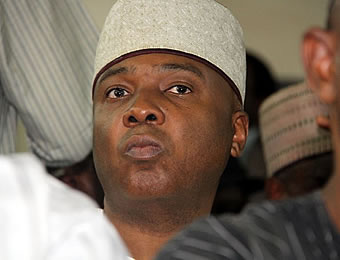At the beginning of the trial in September 2015, Saraki had, in spite of attempts to restrain him, insisted that there was no substance to the case and that it resulted from the inability of some stalwarts of the All Progressives Congress (APC), the political party on whose platform he was elected, to come to terms with his emergence as Senate President. He called his arraignment and trial persecution and not prosecution. It is 21 months now and there is only a 50 percent chance that we might soon see the end of the matter.
Although very few people accused of any malfeasance readily own up to them, events in the course of the trial have lent some credence to Saraki’s speculation. Principal prosecution witness, Mr. Michael Wetkas, a senior detective with the Economic and Financial Crimes Commission (EFCC), did a brilliant of his evidence-in-chief,but all of this crumbled in the course of his cross examination by the defence. It became obvious during cross examination for instance that necessary procedures, precedent to the arraignment of public officials were not followed in Saraki’s case. Such failure should ordinarily spell injury on the tenability of the suit.
But if Wetkas wobbled, subsequent prosecution witnesses totally fumbled. They turned out to be way below the Wetkas performance, churning out a variety of inconsistencies that tore the case apart and established that a lot of their testimony was actually hearsay!
Saraki was never called in for questioning, neither were there any forensic examination of evidence, just as investigators had scant, sometimes, totally nil knowledge of how some of the items listed in the charge sheet operate.
Such spectacles of testimonies and their puncturing by the defence is what an anxious nation has witnessed in this case,since it started close to two years back now. And at the end of cross examination of the fourth prosecution witness in May, Defence counsel, Mr. Paul Erokoro (SAN), said the defence would file a no-case submission, contending that no credible evidence had been led by the prosecution to cause Saraki to defend the charges. The Tribunal then adjourned until Thursday, June 8, for the adoption of written addresses on the no case submission.
After the Code of Conduct Tribunal (CCT) took the address of counsel to the Economic and Financial Crimes Commission (EFCC), Mr Rotimi Jacobs, in response to the no case submission presented by Saraki’s counsel at the last sitting,earlier this week, its chairman Mr. Danladi Umar informed that a date for the ruling on the no case submission would be communicated to the parties. Rotimi had tried to persuade the court to dismiss the no case submission and averred that the Federal Government had established a prima facie case against the Senate President.
Adopting the defendant’s written addresses before the CCT,lead defence counsel, Chief Kanu Agabi (SAN) said: “Our submission is that the prosecution has not made out a case warranting an answer from the Defence. He therefore asked the court to uphold the defence’s no case submission plead.
Since the Federal Government insists that it has a strong case against Saraki, it is left to the Tribunal to take a decision that best serves the interest of the country between upholding the plea of the defence team and affirming the submission of the prosecutors who had spent the last 22 months seeking to justify their case.
The two-man panel sitting over this case finds itself in a particularly difficult situation. Keen observers of this case would remember that Saraki had, on a number of occasions expressed dissatisfaction with the ability of the lead judge to be impartial on this matter. He had asked that the lead judge disqualifies himself but had been curiously turned down
In the same breath, Umar had been an object of blackmail from a particular online medium claiming that the tribunal members had been bribed and influenced to deliver its ruling one way or the other. The Tribunal will however need to demonstrate unparalleled courage and boldness in serving the course of justice by its decision on this matter.
Observers believe that the next siting of the court may bring us to the final determination of the case and save Nigeria from the undue tension and expense that the trial has been. Given the common factor in cases of quasi-criminal nature like this asset declaration matter that the prosecution must prove its case beyond reasonable doubt, the inconsistencies already found in the testimonies of prosecution witness may just save the country the anguish of the long drawn legal battle that a ruling against the no case submission portends. All eyes and indeed posterity are now on the judges on the CCT.
Akintoba Fatigun is a former Executive Chairman of Ekiti LG in Kwara State.




